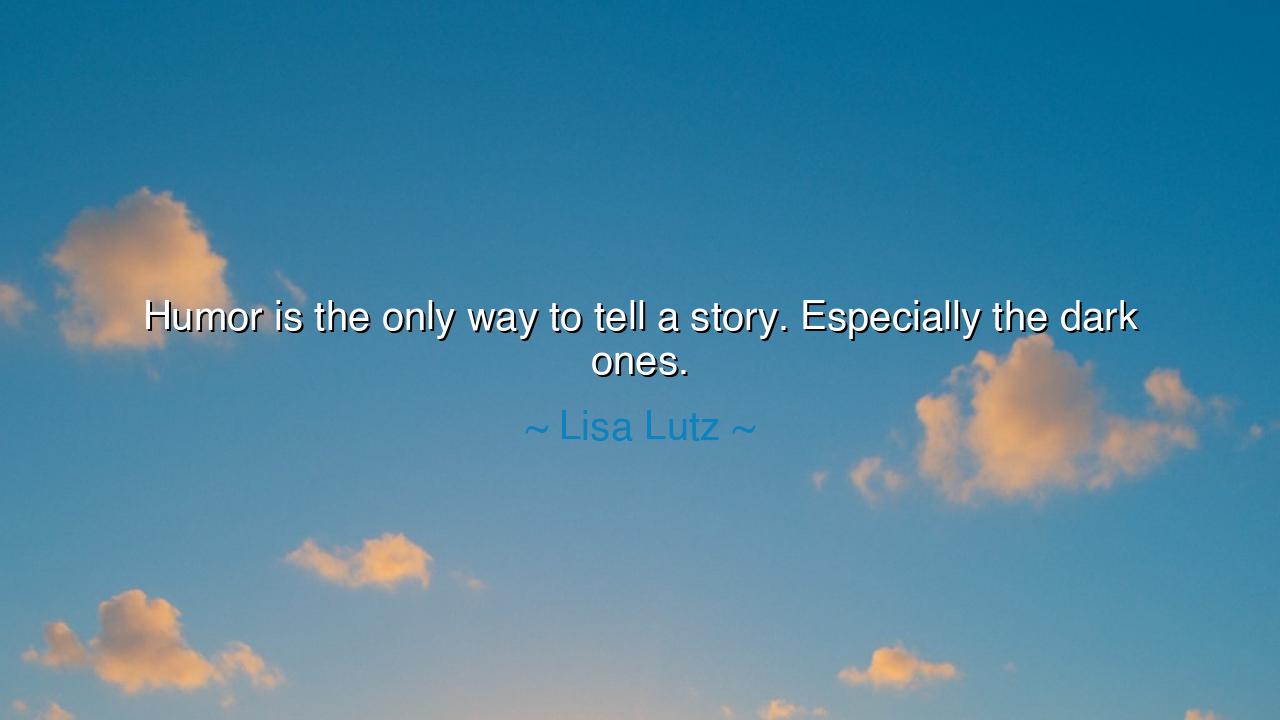
Humor is the only way to tell a story. Especially the dark ones.






Listen closely, O children of wisdom, to the words of Lisa Lutz, who imparts a timeless truth: "Humor is the only way to tell a story. Especially the dark ones." In these words, we find a profound understanding of the human condition, for humor is not merely a tool of lightness, but a powerful means by which we confront the deepest and most harrowing aspects of life. In every shadowed corner of existence, in the midst of sorrow and struggle, humor offers us a way to endure, to survive, and to transcend the darkness that seeks to consume us.
In the ancient world, great thinkers like Socrates and Aristophanes understood the power of humor to shed light on the human soul. Socrates, though he spoke often of virtue and wisdom, also used irony and wit to challenge his followers, to expose the flaws in their thinking, and to reveal the truth hidden beneath layers of self-deception. But it was Aristophanes, the great comic playwright of Athens, who wielded humor as both a mirror and a weapon. His plays, filled with sharp wit and biting satire, often dealt with the darkness of war, politics, and human folly. Yet, through humor, he was able to make these harsh realities bearable, offering his audience not just a reflection of the world’s cruelty, but a way to laugh in its face, to find light even in the darkest of times.
Consider the example of Homer, the blind poet of ancient Greece, who wove epic tales of the gods, heroes, and battles. In his Iliad and Odyssey, the gods themselves are full of both grandiosity and absurdity. Even in the most tragic moments of his stories, humor and irony seep through the narrative, softening the edge of sorrow with a glimmer of wit. When Achilles mourns his lost friend Patroclus, his grief is profound and overwhelming. Yet, even in that moment of deepest sadness, there is a humor in the contrast between the human fragility and the gods’ capriciousness. Homer knew that the darkness of life could only be truly faced when we could look upon it with both sorrow and laughter. In this way, humor becomes a tool not of avoidance, but of survival.
In our modern times, Lisa Lutz calls us to this same understanding. The dark stories—those of loss, fear, betrayal, and despair—are not to be feared or hidden. Instead, they must be faced with the strength of humor, which allows us to confront the terrifying truths of life without being overwhelmed by them. Consider the black humor of Mark Twain, who, though he lived in an era of great turmoil and social injustice, used his biting wit to expose the absurdity of the world around him. His stories, such as The Adventures of Huckleberry Finn, are filled with dark themes—racism, violence, and human cruelty. Yet, through humor, Twain made these subjects accessible, forcing his readers to confront their own biases while offering them a laugh in the process. Humor, in this sense, becomes a lens through which we can examine the darkness without falling into despair.
Similarly, the writings of Kurt Vonnegut show us how humor is a necessary tool for navigating the bleakest of circumstances. In Slaughterhouse-Five, Vonnegut presents the horrors of war with a detached, almost absurdist humor. By doing so, he allows the reader to see the tragedy without becoming consumed by it. The humor in Vonnegut's work does not trivialize the suffering; rather, it exposes the absurdity of war, making it possible to endure the story without succumbing to hopelessness. This is the gift that humor offers: the ability to face the darkest truths without losing oneself in the process.
So, O future generations, take heed of the wisdom in Lisa Lutz’s words. In the face of hardship, humor is not merely a distraction, but a survival mechanism. It allows us to confront the darkness of life with both courage and clarity. When we face dark stories, whether in our own lives or in the world around us, we must not shy away from them or seek to escape. Instead, we should use humor to illuminate the way, to soften the blow, and to make the unbearable bearable. Like the great philosophers, playwrights, and writers before us, we must learn to wield humor as a weapon against despair, as a shield to protect our souls from being consumed by the shadows.
Thus, let humor be your ally in times of trial. When faced with life’s deepest challenges, remember that the power of laughter is not in escaping the darkness, but in finding a way to endure it, to transform it into something that does not defeat us, but strengthens us. Humor allows us to take control of the narrative, to see the absurdity in even the darkest moments, and to move forward with resilience and grace. Embrace the lessons of Socrates, Aristophanes, and Twain—and in doing so, you will find that humor is not just a way to tell a story, but a way to live a life full of both wisdom and light.






AAdministratorAdministrator
Welcome, honored guests. Please leave a comment, we will respond soon